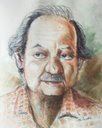 The World Elders Day will be observed tomorrow (1.10.09) followed by Mahatma Gandhi’s birth anniversary the next day (2.10.09). Mohandas Gandhi was born on 2.10.1869 and assassinated on 31.1.1948 at the age of 78.
The World Elders Day will be observed tomorrow (1.10.09) followed by Mahatma Gandhi’s birth anniversary the next day (2.10.09). Mohandas Gandhi was born on 2.10.1869 and assassinated on 31.1.1948 at the age of 78.World Elders Day
 Today, it is sad to see that this day which ought to have been celebrated at home is celebrated more outside in old age and destitute homes. The reason: today there is an increasing impatience among young men and women and this has forced many elders, willingly or unwillingly, to move into homes for the aged.
Today, it is sad to see that this day which ought to have been celebrated at home is celebrated more outside in old age and destitute homes. The reason: today there is an increasing impatience among young men and women and this has forced many elders, willingly or unwillingly, to move into homes for the aged.Elders are like children with their mood swings, sometimes too quickly not allowing us enough time to grasp. Elders need attention at homes and if we don’t give it, they start demanding it. When the elders begin to feel they are neglected, they adopt ways to attract attention from us and at times irritating. Mental agitation, restlessness, falling sick often, nausea, vomiting and even suicide attempts could be just reactions to this neglect by family members. Immediate medical care, physical and psychological alone may not be enough. We need to spend some quality time with them showing genuine concern. They deserve love care and respect for the simple reason that they brought you up with a load of problems and sacrifice.

...My experience in the political field are now known, not only in India, but to a certain extent to the ‘civilized’ world. For me , they have not much value, and the title of Mahatma that they have won for me has, therefore, even less. Often the title has deeply pained me; and there is not a moment I can recall when it may be said to have tickled me. But I should certainly like to narrate my experiments in the spiritual field which are known only to myself, and from which I have derived such powers as I possess for working in the political field. If the experiments are really spiritual, then there can be no room for self-praise. They can only add to my humility. The more I reflect and look back on the past, the more vividly do I feel my limitations...
...But for me, truth is the sovereign principle, which includes numerous other principles. This truth is not only truthfulness in the world, but truthfulness in thought also, and not only the relative truth of our conception, but the Absolute Truth, the Eternal principle, that is God...
...In judging myself I shall try to be as harsh as truth, as I want others also to be. Measuring myself by that standard I must exclaim Surdas:





